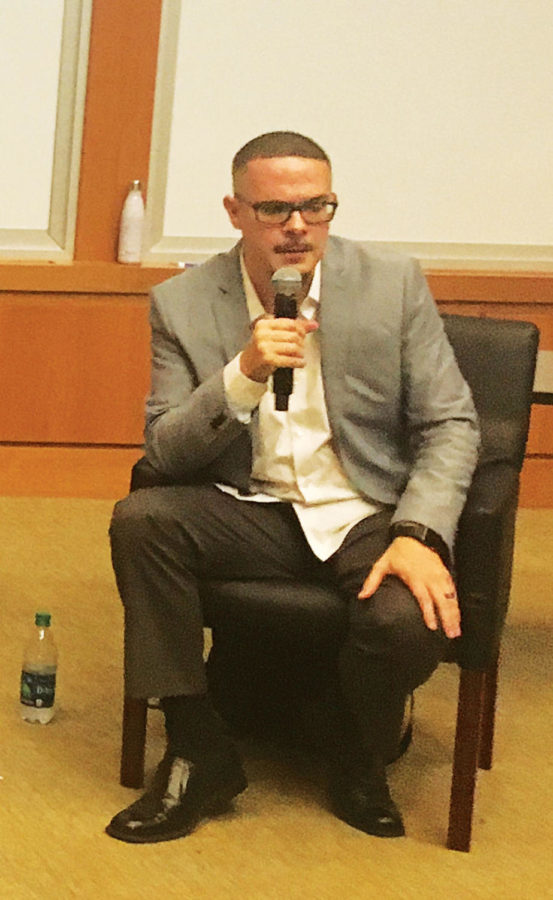Civil rights leaders advocate for Black Lives Matter
October 9, 2016
UK’s Martin Luther King Center’s latest episode of their “Convo Series” featured Bobby Seale, a co-founder of the Black Panther Party and Shaun King, writer and civil rights activist. King is also a native of Versailles, Kentucky and writes for The New York Daily News.
The event was on Thursday, Oct. 6 in the Gatton College of Business and Economics Kincaid auditorium. The goal was to bring these two together to discuss activism in the 1960s and now.
During the conversation, a very tightly-packed diverse room of UK students, staff, faculty and Lexington community members were able to listen to a broad range of topics including the Black Lives Matter movement, police brutality, counter intelligence, Black Patriotism, stereotypes and self-love.
Seale was introduced by Gerald Smith, a UK history professor, as one of the “last surviving architects” of the social change launched in the 1960s, and also discussed his new book, “Power to the People: The World of the Black Panthers.”
The book was co-authored with Stephen Shames, photographer, which will be released Oct. 18, three days after the official founding of the original Black Panther Party for Self-Defense, 50 years ago.
Seale said he had to grow up without knowledge and self-awareness until he started to study the writings of W.E.B Du Bois.
“I was brainwashed with this notion that Africa is backwards and stupid,” Seale said. “It was what society had taught.”
He and Huey P. Newton, another co-founder of the Black Panther Party, brought an African-American studies program to Merritt College in an effort to dissolve this issue.
Related: UK police investigating racial bias harassments
Seale said how reading brought him to understand that there were about 168,000 black men who fought in the Union Northern army during the civil war, and about 38,000 of them died to defeat the Confederates.
“That inspired me,” Seale said. “It brought me to the realization that I’m a first-class citizen, I’m a first class human being.”
During the conversation, Seale mentioned his admiration for Martin Luther King Jr.’s articulation and his non-violent ideologies.
“I thought it was really inspirational that Bobby Seale talked about getting a lot of his inspiration from Martin Luther King,” said Naija Omari, a kinesiology junior. “The Black Panther Party is seen as a violent movement although they hardly ever used their guns.”
Mid-conversation, the floor switched to King who highlighted Seale’s work as a Veteran of the United States Airforce, as a college student and as a leading NASA technician for Project Gemini.
He discussed the stereotypes of the Panthers as “thugs” and as “terrorists” in the media, and related it to the BLM movement.
“It almost makes their tactics seem weak when we see that the same thing they did to you, 40 and 50 years ago, is the same foolishness that they’re trying to pull on us,” King said.
Afterward, Seale briefly discussed life as a political prisoner, writing his autobiography in two months through a tape recorder throughout the Black Nationalist movement and how the Federal Bureau of Investigation led him there.
During the movement, the FBI created a program named COINTELPRO, an acronym for Counter Intelligence Program, which aimed at surveilling, infiltrating and dismantling domestic political programs, specifically, the Black Panther Party.
Related: UK learns the importance of paying attention at Bale Boone symposium
J. Edgar Hoover, FBI director during the Civil Rights movement, created a press release to local officials claiming that the Black Panther Party represented the greatest threat to the country’s security. Police started openly attacking and arresting members of the Panthers with no restraint.
“Before I went to prison, there were 5,000 members of the Black Panther Party in over 48 states,” Seale said. “When I was released from prison there were maybe 2,500.”
During the 1960s few black people held public office. Seale’s main objective for the party was to connect college students and those that he referred to as the “brothers on the block” in a political space to register them to vote and to start electing progressive black people into office, Seale said.
King closed by explaining “The Injustice Boycott” of cities, states and corporations that are tied to police brutality and racial injustice in America, which will be announced Dec.
The Black Panther Party worked with the United Nations and struggling war prisoners of Vietnam, among other international liberation groups.
Because of the political differences between the party’s founding members and declining finances, the Black Panther Party ended in 1982.
Although members of the Black Panthers Party have been stereotyped and misunderstood throughout the years, students, staff and faculty all thought the meeting served its purpose.
The MLK Center’s Orvis Keen called the conversation one of the center’s most successful events.
“I love that this whole auditorium is filled, but I wish that it could be an even larger auditorium,” said Austin Zinkle, a master’s student in history. “I hate that this couldn’t be someplace that the entire UK community could see.”


























































































































































